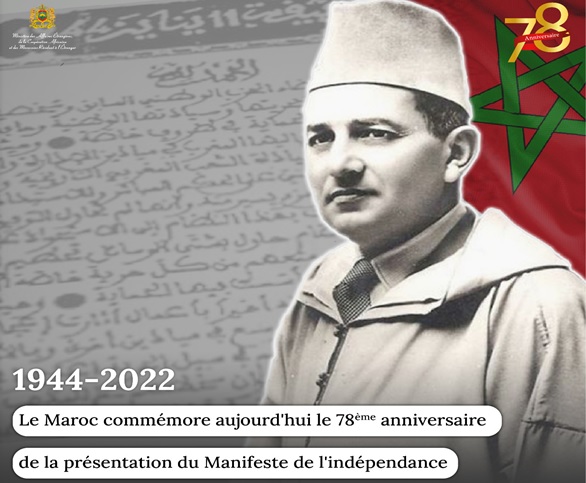
The 78th anniversary of the presentation of the Independence Manifesto, on January 11, 1944, celebrated today in Morocco, constitutes a historic event that will forever remain engraved in the collective memory of the Moroccan people, due to its importance on the path of the struggle for independence and freedom.

HM. the late King Mohammed V
This glorious episode of national liberation is a pivotal moment in the struggle for freedom that has triggered the phase of public demand for independence and national sovereignty.
The culmination of several national and international events and years of armed and political resistance, this remarkable document, the fruit of a pact between the late Sultan Mohammed V and the leaders of the resistance, represents a milestone in the trajectory of the national struggle.
Indeed, the history of the national struggle for independence is strewn with decisive moments, like the uprising against the “Berber Dahir” of 1930 and the presentation by the Moroccan action committee, the nucleus of the national movement , of a reform plan to the French government in 1934 and 1936.
The international context was marked by the outbreak of the Second World War and the emergence of calls for decolonization with the publication of the Atlantic Charter of 1941, a document bringing together a series of principles to be used to maintain international peace and security.
The meeting in 1943, between the late Sultan Mohammed V and the American President at the time, Franklin D. Roosevelt, on the sidelines of the Anfa conference in Casablanca, which brought together the leaders of the allied camp during the Second World War, endowed the national movement with
It is under these circumstances that 67 leading figures of the Moroccan resistance, including a woman, signed this manifesto, in consultation with the late Sultan Mohammed V, demanding the independence of Morocco. The document was subsequently presented to the colonial authorities and to the representations of the three powers (United States, Great Britain and the former Soviet Union).
This unpublished document, which opens with a preamble of arguments, sets out the demands of the national movement, calling for the unity and independence of Morocco and for negotiations with the countries concerned and requesting, in addition to the accession of Morocco to the Atlantic Charter and its participation in the Peace Conference.
This courageous action dealt a massive blow to the Franco-Spanish occupation policy, especially as this document came in association with a series of important positions which showed a strong cohesion between the people and the Throne.
The celebration of this historic event is an opportunity to remind the younger generations, almost eight decades later, of the stages through which the process of independence of their country passed, but above all to highlight the sacrifices of the men and women of the national resistance movement for the liberation of the fatherland.
The commemoration of this event symbolizes the attachment of Moroccans to their history of liberation and a recognition of the enormous sacrifices made by the glorious Alaouite Throne and the Moroccan people who have succeeded in bending the perfidious ambitions of the colonizer in the ultimate goal of recovering the ‘independence.
